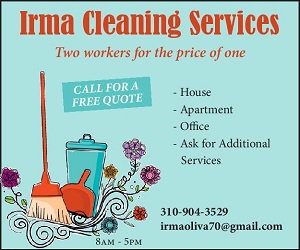Dear Michael: I own a secondary home that I use as a rental property. I am thinking of renting it out as a short-term vacational rental. Do you think the return is greater with a long-term tenant or short term rental?
Answer: Short-term rental is defined as any stay that is less than 30 days. There are many expenses and factors that you will need to take into consideration if you plan to do a short-term rental: A) the cost of furnishing including household necessities. You will have to furnish your property from A to Z with all essential necessities including: linens, dishes, bathroom supplies, etc. As if it was your own live-in home. B) Your overhead cost needs to include your mortgage payment (if there is one), your property taxes, transient occupancy tax (TOT). This is a tax collected by the city for short-term vacation rentals; insurance, cable (including Wi-Fi), gardener, and all other utilities. C) You will also have to schedule a cleaning crew every time someone checks-out and promptly take care of any problems that come up while someone is staying over. As you can see, there is a lot more work involved. But there are also advantages: your home is still accessible to you if you should decide to use it for yourself, family members or friends visiting you. If you market your property correctly on internet sites, your property will give you a better return then a long term tenant. There are many communities that do not allow short-term vacation rentals so please check with your local municipality.
Dear Michael: I’ve seen these “No Down Payment” purchases seminars advertised on the internet and on television and want to know if they are real or just a scam?
Answer: The people in the commercials make a lot of money, but not in real estate. They are in the business of selling seminars. It’s easier selling you those crazy schemes than it is for them to actually do what they are advocating in their programs. If it was so easy, they would be buying real estate that way, not putting out commercials. Consistently making money in real estate requires a lot of hard work and a lot of hours. It isn’t a “get rich quick” scheme, though sometimes the market turns at just the right moment and you can get lucky enough to make a quick buck. If it’s too good to be true, then it isn’t true.
Dear Michael: We are buying our first home and would like to know how much we will need for our down payment?
Answer: The larger the down payment, the less you have to borrow, so therefore the more equity you’ll have. Mortgages with less than a 20% down payment will require a property mortgage insurance (PMI) policy to secure the loan. PMI can run in the hundreds of dollars per month depending on the loan amount. When considering the size of your down payment, consider that you’ll also need money for closing costs, moving expenses, and possibly repairs and decorating. If you can apply 20% down you will have a better rate with no PMI and therefore be saving on your monthly mortgage payments. Please check with your lender for the best possible scenario that will work for you.
Michael Kayem is a Realtor with Re/max Estate Properties serving Culver City and the Westside since 2001. You can contact Michael with your questions at 310-390-3337 or e-mail them to him at: homes@agentmichael.com















